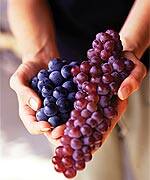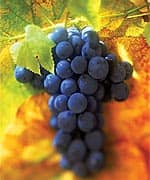Life Extension Magazine®
Scientists continue to uncover a wealth of impressive nutrients contained in the red grape. The latest findings indicate that full spectrum grape extract can help support cardiac health by maintaining youthful endothelial function, regulating platelet aggregation, and reducing inflammation. This article explores how whole grape constituents can have a profound impact on your longevity. An ever growing body of evidence shows that components of red grapes can have powerful effects on vascular health, reducing platelet aggregation and lipid peroxidation while improving endothelial function.1-4 The ability of red grape constituents to fight inflammation is opening new doors in treatment of chronic age-related disorders, including both the prevention and treatment of cancer.5,6 Nowhere are the “blessings of the grape” so evident as in prevention of cardiovascular disease.3 While many factors—ranging from vitamin K deficiency to elevated glucose levels—contribute to cardiovascular risk, perhaps one of the most insidious triggers is inflammation. When inflammation is present, oxidant stress damages blood vessel walls and oxidizes low-density lipoproteins (LDL). These processes cause immune system cells to release inflammatory mediators called cytokines, which in their own turn produce changes in the walls of blood vessels, eventually resulting in accumulation of diseased tissue known as plaques. The same cascade causes platelets, the tiny cell-like fragments responsible for blood clotting, to cluster together (aggregate) excessively, increasing the risk of clot formation that can produce ischemic heart attacks and strokes. In just the past decade, striking new findings have been made on how components of red grapes (including both skin and seeds) affect vascular health, ranging from increasing vital nitric oxide (critical in maintaining endothelial function) to protecting against heart muscle damage.7 Preventing Lipid PeroxidationCardiovascular disease involves a cascade of aberrant biological processes, but one area of interest even amongst the medical establishment is LDL oxidation. LDL transports lipids (fats) from the digestive system to tissues. Comprising both lipid and proteins, LDL particles are particularly vulnerable to the effects of oxygen free radicals. The process, known as lipid peroxidation, is a powerful stimulant of inflammation in blood vessels, eventually leading to plaque formation. Scientists are therefore keenly interested in finding ways to reduce lipid peroxidation by lowering LDL levels directly and by reducing the rate at which these molecules become damaged by reactive oxygen species. Many of the antioxidant molecules in grapes work to reduce that LDL lipid peroxidation process.8,9 The components of red grapes prevent the consequences of oxidant damage in a large number of human tissue models far better than vitamins C, E, and beta-carotene. This protection has been credited with preventing medication-induced liver and kidney damage, heart muscle damage following heart attack, and inducing programmed cell death (apoptosis) in a variety of human cancer cells.8,9
One of the most detailed human studies of grape seed extract and oxidative stress in humans comes from a group of Italian researchers. In a study published in 2002, human volunteers consumed a lipid-rich meal, either with or without 300 mg of a proanthocyanidin-rich grape seed extract.10 The researchers measured the quantity of oxidized fats circulating in the bloodstream following the meals. The unsupplemented group had a 1.5-fold increase in circulating oxidized fats after the meal, compared with those who took the extract. The researchers concluded that even a single dose of grape seed extract can minimize after-meal oxidant stress, both by decreasing oxidants and by increasing the blood’s own antioxidant capacity. Grape seed extract provides the overall effect of reducing the deadly load of oxidized fats that can trigger atherosclerosis. When British researchers gave grape seed extract to healthy volunteers, they found further evidence of the critical role of grape polyphenols.11 Twenty young volunteers took 300 mg of grape seed extract or placebo daily for five days. Serum antioxidant activity increased by more than 11% after just five days in those using grape seed extract. Evidence suggests that red grape extracts, which are rich in polyphenols such as resveratrol, are especially beneficial. When Israeli researchers gave either red or white wine to a group of healthy men for two weeks, they found that lipid peroxidation in plasma dropped by 20% in those who consumed red wine. Men who consumed white wine did not see the same benefit.12 By now there’s simply no question about the remarkable ability of red grape polyphenols to markedly reduce lipid peroxidation (and other cardiovascular risk factors).13-19 That’s a fantastic benefit by itself, but even more impressive when we look at the downstream effects of cutting down on those toxic molecules.
Maintaining Healthy Endothelial FunctionBlood vessel lining cells (endothelial cells) are charged with the critical tasks of maintaining muscle tone and smoothness of arterial walls, thereby controlling blood pressure and the propensity for plaques to form and platelets to congregate.20 It’s becoming increasingly clear that reducing lipid peroxidation-induced damage to delicate endothelial cells is an important way to maintain vascular health.21 There are several mechanisms at work here, including the production of the important signaling molecules nitric oxide and endothelin-1, both of which are beneficially affected by grape seed polyphenols.22,23 Clinical studies are showing powerful effects of grape seed extracts on important measures of vascular health. Sadly, smokers provide researchers with ample opportunities to study the impact of oxidative stress on endothelial function. In a basic but powerful demonstration of how red grape components can battle even the worst oxidant-induced endothelial damage, Greek researchers tested flow-mediated dilation (a measure of endothelial cell-mediated blood vessel relaxation) following either a cigarette alone, or a cigarette along with either red wine or alcohol-free red wine.24 Flow-mediated dilation decreased significantly (a bad sign) after smoking alone, but remained at baseline when the cigarette was accompanied by either red grape beverage. This simple result demonstrates the power of grape polyphenols to preserve vascular function, even in the face of severe oxidant stress. Of course, a high-fat diet is another major cardiovascular risk factor. Chilean scientists studied endothelial function as measured by flow-mediated dilation in a group of healthy volunteers who consumed either a control diet rich in fruits and vegetables, or a high fat diet, for 30 days with red wine and again after 30 days without wine.25 Flow-mediated dilation adversely decreased in the high-fat group compared with the control group when no wine was consumed. However, when both dietary groups drank a glass of red wine each day, there was no adverse decrease. It appears, then, that red wine or its constituents (remember that red wine includes many grape seed-derived compounds) can dramatically reduce the impact of bad lifestyle choices that increase cardiovascular risks. But it’s not just smokers or high- fat consumers who can receive the vascular health benefits of red grapes and their extracts. Swedish scientists measured flow-mediated dilation in 12 healthy subjects less than 40 years old who had no known cardiovascular risk factors, following consumption of red wine with or without alcohol.26 The red wine caused the arteries to dilate, increasing blood flow (many people experience a “flush” with red wine). But even the alcohol-free version significantly increased flow-mediated dilation, which is the important measure of endothelial function. The researchers concluded that the antioxidant properties of the red grape protect against cardiovascular disease by promoting healthy endothelial function. The next natural step would be to examine the effects of a pure red grape extract. Greek scientists recently did just that, conducting a controlled study of red grape extract alone among 30 men with coronary artery disease.27 The men received either a grape polyphenol extract (600 mg) dissolved in water, or pure water as a placebo. Flow-mediated dilation increased (a positive finding) in the men who took the extract, both compared with their own values at baseline and compared with the placebo group. These scientists point out that “polyphenolic compounds from red grapes acutely improve endothelial function in patients with coronary heart disease.” Another group of researchers examined the effects of red wine on measures of blood vessel health.28 Red wine dramatically decreased major inflammatory markers and molecules that can cause blood cells to stick to vessel walls, such as C-reactive protein and monocyte-and endothelial-adhesion molecules. This study demonstrates the ability of red grape-derived polyphenols to protect blood vessel linings, a key component of a healthy cardiovascular system. Numerous additional studies have now established the powerful ability of the red grape and its seed-derived polyphenols to improve health and prevent disease by protecting blood vessel linings and preserving their vital natural functions.29-3
| |||||||
Keeping Platelets SlipperyThe formation of abnormal arterial blood clots (thrombosis) is a primary cause of heart attack and stroke. Thrombosis is the pathological clumping together of platelets, the tiny cell fragments in blood normally responsible for healthy blood coagulation after injury. There are many chemical triggers that cause platelets to clump, or aggregate, and laboratory studies have demonstrated how the polyphenols found in red grape products (including grape seed extracts) act powerfully to regulate platelet aggregation.37-40 In humans, strong support for the health-promoting effect of polyphenols from red grapes comes both from studies of large populations and from clinical trials.41 People who live in cultures where moderate red wine is consumed regularly have lower rates of illness and death from coronary heart disease, and that effect has been tracked in part to decreased platelet activity.42,43
Researchers in Chile determined the coagulation-related risk reduction more specifically when they studied two groups of 21 healthy young men given a “Mediterranean diet” or a high-fat diet for 90 days.44,45 For one month in the middle of that period, the men drank 8 ounces of red wine daily, and various blood factors associated with clotting were determined throughout the study. Regardless of whether the men ate the healthful Mediterranean diet or the riskier high-fat diet, when red wine was added to the mix, clotting factors decreased substantially. Intriguing research supports the role of red grapes in averting aberrant platelet aggregation and coagulation. In 2002, Italian scientists showed that when they gave 20 healthy subjects 10 ounces per day of either red or white wine (both with the same alcohol concentration), the red wine-drinking subjects had significantly lower platelet aggregation after a stimulus than did the white wine-drinkers.46 Not to be outdone, researchers in France’s Bordeaux region showed that it didn’t even have to be red wine, so long as the source of the beverage was the whole grape.47 In a study that can only be described as sophisticated, these scientists randomly assigned healthy volunteers to drink either one ounce of vodka (no polyphenols) or Armagnac, a distilled brandy derived from polyphenol-rich grapes.48 The researchers found that after 14 days, platelet aggregation in the Armagnac group was reduced by 31%, compared to only 11% in the vodka group.47 Equally importantly, two weeks after the alcohol consumption stopped, the vodka drinkers experienced a “rebound” increase of platelet aggregation, which was not seen in the Armagnac group. These results point to the importance of grape polyphenols as the source of the benefits. A study from China further illustrated the “blessings of the grape.”49 Scientists investigated the effects of both red wine and resveratrol, one of the main components of grape extracts, on aggregation of platelets from healthy human volunteers. When they treated the platelets with resveratrol they found that aggregation was inhibited in direct proportion to the amount of resveratrol used. When they conducted the same experiment using rabbits with elevated serum cholesterol and increased platelet aggregation, the researchers were again able to demonstrate potent reduction using grape extract-derived resveratrol. These results provide strong evidence that red grape polyphenols such as resveratrol produce their cardioprotective effects at least in part by inhibiting platelet aggregation. Some skeptics have suggested that the effects of extracts are only seen in the laboratory, where they can be directly applied to the cells being studied.50 It has been convincingly demonstrated, however, that the grape extract components are in fact absorbed from the human intestinal tract in large enough quantities to cause reduction in risk of atherosclerosis.51 This effect can be enhanced when the extracts are high in the polyphenols extracted from grape seeds, and contain a large proportion of the short-chain polyphenols known as oligomers.52-54
Supplementing with Grape Seed ExtractGrape seed extract supplements provide a readily-available, convenient way to capture the abundant cardiovascular benefits of the grape. The Physician’s Desk Reference reports that grape seed extract is safe, with no known toxicity, adverse reactions, or drug interactions.55 Many health practitioners recommend supplementing with 100-600 mg of grape seed extract daily in divided doses. ConclusionAs cardiovascular disease claims more lives than any other disease in America today, grape seed extract may offer much-needed protection. Grape polyphenols fight several key triggers of deadly cardiovascular disease—lipid peroxidation, endothelial dysfunction, and aberrant platelet aggregation. Further, grape polyphenols show promise in protecting against the effects of oxidative stress and poor dietary choices. By incorporating grape seed extract in your daily wellness program, you can help ensure optimal protection for your cardiovascular system. | ||||
| References | ||||
| 1. Soleas GJ, Diamandis EP, Goldberg DM. Wine as a biological fluid: history, production, and role in disease prevention. J Clin Lab Anal. 1997;11(5):287-313. 2. Bavaresco L, Fregoni C, Cantu E, Trevisan M. Stilbene compounds: from the grapevine to wine. Drugs Exp Clin Res. 1999;25(2-3):57-63. 3. van de Wiel A, van Golde PH, Hart HC. Blessings of the grape. Eur J Intern Med. 2001 Dec;12(6):484-9. 4. van de Wiel A. Nutrition and health—favorable effect of wine and wine flavonoids on cardiovascular diseases. Ned Tijdschr Geneeskd. 2002 Dec 21;146(51):2466-9. 5. Sovak M. Grape extract, resveratrol, and its analogs: a review. J Med Food. 2001;4(2):93-105. 6. Bhat KPL, Kosmeder JW, Pezzuto JM. Biological effects of resveratrol. Antioxid Redox Signal. 2001 Dec;3(6):1041-64. 7. Bradamante S, Barenghi L, Villa A. Cardiovascular protective effects of resveratrol. Cardiovasc Drug Rev. 2004;22(3):169-88. 8. Bagchi D, Bagchi M, Stohs SJ, et al. Free radicals and grape seed proanthocyanidin extract: importance in human health and disease prevention. Toxicology. 2000 Aug 7;148(2-3):187-97. 9. Kalkan Yildirim H, Delen Akçay Y, Güvenç U, Yildirim Sözmen E. Protection capacity against low-density lipoprotein oxidation and antioxidant potential of some organic and non-organic wines. Int J Food Sci Nutr. 2004 Aug;55(5):351-62. 10. Natella F, Belelli F, Gentili V, Ursini F, Scaccini C. Grape seed proanthocyanidins prevent plasma postprandial oxidative stress in humans. J Agric Food Chem. 2002 Dec 18;50(26):7720-5. 11. Nuttall SL, Kendall MJ, Bombardelli E, Morazzoni P. An evaluation of the antioxidant activity of a standardized grape seed extract, Leucoselect. J Clin Pharm Ther. 1998 Oct;23(5):385-9. 12. Aviram M, Lavy A, Fuhrman B. Plasma lipid peroxidation: inhibited by drinking red wine but stimulated by white wine. Harefuah.1994 Dec 15;127(12):517-20, 575-6. 13. bu-Amsha CR, Burke V, Mori TA, et al. Red wine polyphenols, in the absence of alcohol, reduce lipid peroxidative stress in smoking subjects. Free Radic Biol Med. 2001 Mar 15;30(6):636-42. 14. Avellone G, Di G, V, Campisi D, et al. Effects of moderate Sicilian red wine consumption on inflammatory biomarkers of atherosclerosis. Eur J Clin Nutr. 2006 Jan;60(1):41-7. 15. Guarda E, Godoy I, Foncea R, et al. Red wine reduces oxidative stress in patients with acute coronary syndrome. Int J Cardiol. 2005 Sep 15;104(1):35-8. 16. Marfella R, Cacciapuoti F, Siniscalchi M, et al. Effect of moderate red wine intake on cardiac prognosis after recent acute myocardial infarction of subjects with Type 2 diabetes mellitus. Diabet Med. 2006 Sep;23(9):974-81. 17. Tsang C, Higgins S, Duthie GG, et al. The influence of moderate red wine consumption on antioxidant status and indices of oxidative stress associated with CHD in healthy volunteers. Br J Nutr.2005 Feb;93(2):233-40. 18. Williams MJ, Sutherland WH, Whelan AP, McCormick MP, de Jong SA. Acute effect of drinking red and white wines on circulating levels of inflammation-sensitive molecules in men with coronary artery disease. Metabolism. 2004 Mar;53(3):318-23. 19. Young JF, Dragsted LO, Daneshvar B, et al. The effect of grape-skin extract on oxidative status. Br J Nutr. 2000 Oct;84(4):505-13. 20. Coimbra SR, Lage SH, Brandizzi L, Yoshida V, da Luz PL. The action of red wine and purple grape juice on vascular reactivity is independent of plasma lipids in hypercholesterolemic patients. Braz J Med Biol Res. 2005 Sep;38(9):1339-47. 21. Folts JD. Potential health benefits from the flavonoids in grape products on vascular disease. Adv Exp Med Biol. 2002;505:95-111. 22. Caimi G, Carollo C, Lo PR. Wine and endothelial function. Drugs Exp Clin Res. 2003;29(5-6):235-42. 23. Corder R, Warburton RC, Khan NQ, et al. The procyanidin-induced pseudo laminar shear stress response: a new concept for the reversal of endothelial dysfunction. Clin Sci (Lond). 2004 Nov;107(5):513-7. 24. Karatzi K, Papamichael C, Karatzis E, et al. Acute smoking induces endothelial dysfunction in healthy smokers. Is this reversible by red wine’s antioxidant constituents? J Am Coll Nutr. 2007 Feb;26(1):10-5. 25. Cuevas AM, Guasch V, Castillo O, et al. A high-fat diet induces and red wine counteracts endothelial dysfunction in human volunteers. Lipids. 2000 Feb;35(2):143-8. 26. Agewall S, Wright S, Doughty RN, et al. Does a glass of red wine improve endothelial function? Eur Heart J. 2000 Jan;21(1):74-8. 27. Lekakis J, Rallidis LS, Andreadou I, et al. Polyphenolic compounds from red grapes acutely improve endothelial function in patients with coronary heart disease. Eur J Cardiovasc Prev Rehabil. 2005 Dec;12(6):596-600. 28. Estruch R, Sacanella E, Badia E, et al. Different effects of red wine and gin consumption on inflammatory biomarkers of atherosclerosis: a prospective randomized crossover trial. Effects of wine on inflammatory markers. Atherosclerosis. 2004 Jul;175(1):117-23. 29. Badia E, Sacanella E, Fernandez-Sola J, et al. Decreased tumor necrosis factor-induced adhesion of human monocytes to endothelial cells after moderate alcohol consumption. Am J Clin Nutr. 2004 Jul;80(1):225-30. 30. Boban M, Modun D, Music I, et al. Red wine induced modulation of vascular function: separating the role of polyphenols, ethanol, and urates. J Cardiovasc Pharmacol. 2006 May;47(5):695-701. 31. Diebolt M, Bucher B, Andriantsitohaina R. Wine polyphenols decrease blood pressure, improve NO vasodilatation, and induce gene expression. Hypertension. 2001 Aug;38(2):159-65. 32. Leighton F, Cuevas A, Guasch V, et al. Plasma polyphenols and antioxidants, oxidative DNA damage and endothelial function in a diet and wine intervention study in humans. Drugs Exp Clin Res. 1999;25(2-3):133-41. 33. Naissides M, Pal S, Mamo JC, James AP, Dhaliwal S. The effect of chronic consumption of red wine polyphenols on vascular function in postmenopausal women. Eur J Clin Nutr. 2006 Jun;60(6):740-5. 34. Rakici O, Kiziltepe U, Coskun B, Aslamaci S, Akar F. Effects of resveratrol on vascular tone and endothelial function of human saphenous vein and internal mammary artery. Int J Cardiol. 2005 Nov 2;105(2):209-15. 35. Whelan AP, Sutherland WH, McCormick MP, et al. Effects of white and red wine on endothelial function in subjects with coronary artery disease. Intern Med J. 2004 May;34(5):224-8. 36. Kar P, Laight D, Shaw KM, Cummings MH. Flavonoid-rich grapeseed extracts: a new approach in high cardiovascular risk patients? Int J Clin Pract. 2006 Nov;60(11):1484-92. 37. Dobrydneva Y, Williams RL, Blackmore PF. trans-Resveratrol inhibits calcium influx in thrombin-stimulated human platelets. Br J Pharmacol. 1999 Sep;128(1):149-57. 38. Kaneider NC, Mosheimer B, Reinisch N, Patsch JR, Wiedermann CJ. Inhibition of thrombin-induced signaling by resveratrol and quercetin: effects on adenosine nucleotide metabolism in endothelial cells and platelet-neutrophil interactions. Thromb Res. 2004;114(3):185-94. 39. Ruf JC, Berger JL, Renaud S. Platelet rebound effect of alcohol withdrawal and wine drinking in rats. Relation to tannins and lipid peroxidation. Arterioscler Thromb Vasc Biol. 1995 Jan;15(1):140-4. 40. Xia J, Allenbrand B, Sun GY. Dietary supplementation of grape polyphenols and chronic ethanol administration on LDL oxidation and platelet function in rats. Life Sci. 1998;63(5):383-90. 41. Ruf JC. Alcohol, wine and platelet function. Biol Res. 2004;37(2):209-15. 42. Renaud SC, Ruf JC. Effects of alcohol on platelet functions. Clin Chim Acta. 1996 Mar 15;246(1-2):77-89. 43. Ruf JC. Wine and polyphenols related to platelet aggregation and atherothrombosis. Drugs Exp Clin Res. 1999;25(2-3):125-31. 44. Mezzano D, Leighton F. Haemostatic cardiovascular risk factors: differential effects of red wine and diet on healthy young. Pathophysiol Haemost Thromb. 2003 Sep 20;33(5-6):472-8. 45. Mezzano D. Distinctive effects of red wine and diet on haemostatic cardiovascular risk factors. Biol Res. 2004;37(2):217-24. 46. Pignatelli P, Lenti L, Pulcinelli FM, et al. Red and white wine differently affect collagen-induced platelet aggregation. Pathophysiol Haemost Thromb. 2002 Sep;32(5-6):356-8. 47. Umar A, Depont F, Jacquet A, et al. Effects of armagnac or vodka on platelet aggregation in healthy volunteers: a randomized controlled clinical trial. Thromb Res. 2005;115(1-2):31-7. 48. Umar A, Guerin V, Renard M, et al. Effects of armagnac extracts on human platelet function in vitro and on rat arteriovenous shunt thrombosis in vivo. Thromb Res. 2003 May 1;110(2-3):135-40. 49. Wang Z, Huang Y, Zou J, et al. Effects of red wine and wine polyphenol resveratrol on platelet aggregation in vivo and in vitro. Int J Mol Med. 2002 Jan;9(1):77-9. 50. Goldberg DM, Yan J, Soleas GJ. Absorption of three wine-related polyphenols in three different matrices by healthy subjects. Clin Biochem. 2003 Feb; 36(1):79-87. 51. Pace-Asciak CR, Rounova O, Hahn SE, Diamandis EP, Goldberg DM. Wines and grape juices as modulators of platelet aggregation in healthy human subjects. Clin Chim Acta. 1996 Mar 15;246(1-2):163-82. 52. Aruoma OI, Sun B, Fujii H, et al. Low molecular proanthocyanidin dietary biofactor Oligonol: Its modulation of oxidative stress, bioefficacy, neuroprotection, food application and chemoprevention potentials. Biofactors. 2006;27(1-4):245-65. 53. Carini M, Stefani R, Aldini G, Ozioli M, Facino RM. Procyanidins from Vitis vinifera seeds inhibit the respiratory burst of activated human neutrophils and lysosomal enzyme release. Planta Med. 2001 Nov;67(8):714-7. 54. Ward NC, Croft KD, Puddey IB, Hodgson JM. Supplementation with grape seed polyphenols results in increased urinary excretion of 3-hydroxyphenylpropionic Acid, an important metabolite of proanthocyanidins in humans. J Agric Food Chem. 2004 Aug 25;52(17):5545-9. 55. Available at: http://www.pdrhealth.com/drug_info/nmdrugprofiles/herbaldrugs/101305.shtml. Accessed June 27, 2007. 56. Yu H, Wang SE, Zhao C, Xu G. Study of anti-atherosclerosic effect of grape seed extract and its mechanism. Wei Sheng Yan.Jiu. 2002 Aug;31(4):263-5. 57. Zern TL, West KL, Fernandez ML. Grape polyphenols decrease plasma triglycerides and cholesterol accumulation in the aorta of ovariectomized guinea pigs. J Nutr. 2003 Jul;133(7):2268-72. 58. Fuhrman B, Volkova N, Coleman R, Aviram M. Grape powder polyphenols attenuate atherosclerosis development in apolipoprotein E deficient (E0) mice and reduce macrophage atherogenicity. J Nutr . 2005 Apr;135(4):722-8. 59. Bagchi D, Sen CK, Ray SD, et al. Molecular mechanisms of cardioprotection by a novel grape seed proanthocyanidin extract. Mutat Res. 2003 Feb;523-524:87-97. |





